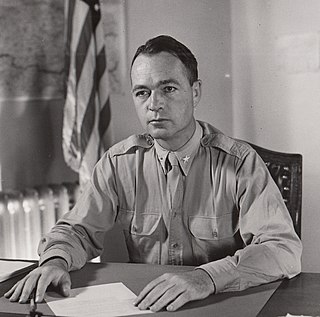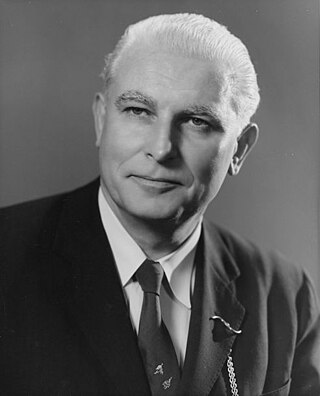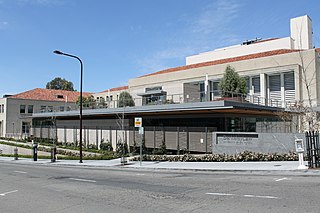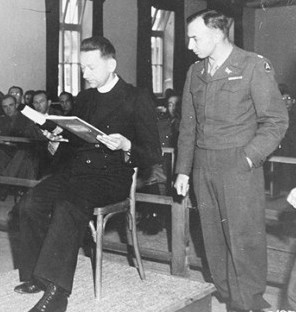
The Nuremberg trials were held by the Allies against representatives of the defeated Nazi Germany for plotting and carrying out invasions of other countries and atrocities against their citizens in World War II.

The University of Chicago Law School is the law school of the University of Chicago, a private research university in Chicago, Illinois. It employs more than 180 full-time and part-time faculty and hosts more than 600 students in its Juris Doctor program, while also offering the Master of Laws, Master of Studies in Law and Doctor of Juridical Science degrees in law. The law school has the third highest percentage of recent graduates clerking for federal judges after Stanford Law School and Yale Law School.
Herbert Wechsler was an American legal scholar and former director of the American Law Institute (ALI). He is most widely known for his constitutional law scholarship and for the creation of the Model Penal Code. The Journal of Legal Studies has identified Wechsler as one of the most cited legal scholars of the 20th century.

Telford Taylor was an American lawyer and professor. Taylor was known for his role as lead counsel in the prosecution of war criminals after World War II, his opposition to McCarthyism in the 1950s, and his outspoken criticism of American actions during the Vietnam War.

Thomas Joseph Dodd was an American attorney and diplomat who served as a United States Senator and Representative from Connecticut. He is the father of U.S. Senator Christopher Dodd and U.S. Ambassador Thomas J. Dodd Jr.

Henry T. King Jr. was an attorney who served as a U.S. Prosecutor at the Nuremberg Trials in 1946-47. Late in his career, he became a law professor and an activist, writer, and lecturer working on international law and war crimes; David M. Crane has described King as "the George Washington of modern international law".
Franz Leopold Neumann was a German political activist, Western Marxist theorist and labor lawyer, who became a political scientist in exile and is best known for his theoretical analyses of Nazism. He studied in Germany and the United Kingdom, and spent the last phase of his career in the United States, where he worked for the Office of Strategic Services from 1943 to 1945. During the Second World War, Neumann spied for the Soviet Union under the code-name "Ruff". Together with Ernst Fraenkel and Arnold Bergstraesser, Neumann is considered to be among the founders of modern political science in the Federal Republic of Germany.

Benjamin Berell Ferencz was an American lawyer. He was an investigator of Nazi war crimes after World War II and the chief prosecutor for the United States Army at the Einsatzgruppen trial, one of the 12 subsequent Nuremberg trials held by US authorities at Nuremberg, Germany. When the Einsatzgruppen reports were discovered, Ferencz pushed for a trial based on their evidence. When confronted with a lack of staff and resources, he personally volunteered to serve as the prosecutor.

Morris Durham "Moe" Davis is an American retired U.S. Air Force colonel, attorney, educator, politician, and former administrative law judge.

Philippe Joseph Sands, KC Hon FBA is a British and French writer and lawyer at 11 King's Bench Walk and Professor of Laws and Director of the Centre on International Courts and Tribunals at University College London. A specialist in international law, he appears as counsel and advocate before many international courts and tribunals, including the International Court of Justice, the International Tribunal for the Law of the Sea, the European Court of Justice, the European Court of Human Rights and the International Criminal Court.
Daniel Julius Meltzer was an American lawyer and law professor who taught at Harvard Law School. He worked in the Obama Administration as Principal Deputy Counsel from January 2009 through June 1, 2010.
Benjamin Kaplan was an American copyright and procedure scholar and jurist. He was also notable as "one of the principal architects" of the Nuremberg trials. And as Reporter to the U.S. Judicial Conference Advisory Committee on Civil Rules, he played a pivotal role in the 1966 revisions to Federal Rule of Civil Procedure 23, which transformed class action practice in the U.S.
James Friedman was Professor of Law Emeritus at the University of Maine School of Law.

The University of California, Berkeley School of Law is the law school of the University of California, Berkeley. It is one of 14 schools and colleges at the university.
Francis M. Shea was an American lawyer, law professor and United States government official.
Edwin K. Steers was an American politician who served as the Attorney General of Indiana from 1953 to 1965. He also served as a U.S. prosecutor at the Nuremberg trials and the Belsen trial following the Second World War.
John Rappaport is an American legal scholar who is currently a professor of law and the Ludwig and Hilde Wolf Research Scholar at the University of Chicago Law School. He is an expert on criminal procedure and evidence law.

William Denson was an American lawyer and military prosecutor who served as Chief Prosecutor in the trials of war criminals of Nazi concentration camps.
Frank Mitchel Tuerkheimer was an American lawyer, legal professor, and prosecutor. He was an associate Watergate special prosecutor and served as the U.S. Attorney for the Western District of Wisconsin. He was also an emeritus professor of law at the University of Wisconsin Law School.

Albert W. Alschuler is an American legal scholar best known for his work in criminal procedure and criminal law. He is the Julius Kreeger Professor Emeritus at the University of Chicago Law School. He previously taught at the University of Texas at Austin, the University of Colorado, and the University of Pennsylvania, and is known particularly for a study of plea bargaining.











